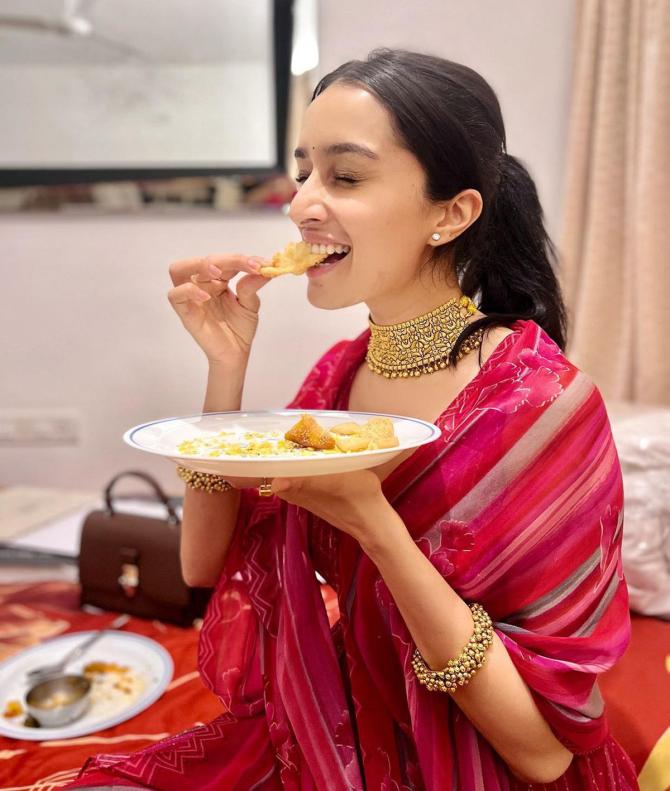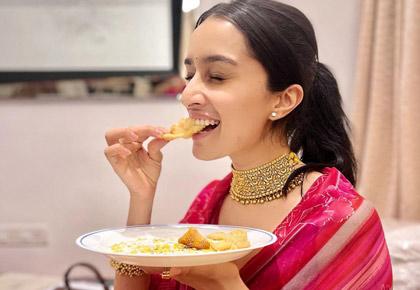Avoid late-night or bedtime consumption of sweets or heavy snacks.
Plan meals strategically and adhere to a structured eating schedule, advises Dr Harshal Ekatpure.
- You can ask your health-related questions HERE.

During the festive season, it is difficult to say no to the tempting sweets and savouries that are on offer.
However, this time of celebration is also when one must be most watchful about one's health.
It is crucial to strike the right balance between taste and health, especially for individuals with specific health conditions like diabetes or hypertension.
Here are some tips how individuals with these specific health conditions can adapt their diet and lifestyle to ensure a joyful and healthful Navratri celebration.
Tips To Take Care Of Your Diet
Make calorie conscious choices
Limit your intake of sweets to 100 kcal per serving.
Strategic snacking
Enjoy sweets or calorie-rich snacks in moderation, preferably between major meals, to manage calorie consumption effectively.
Adjust the subsequent meal's carb content to accommodate the calories consumed from snacks.
Mindful preparation
Choose home-cooked snacks prepared with minimal oil and sugar for sweetness, avoiding ghee, butter and saturated oils.
Diabetics should opt for mithai prepared with sugar substitutes.
Portion control for diabetics
Diabetic individuals should exercise portion control, monitor blood glucose levels frequently and adjust medication or insulin doses as needed under medical guidance.
Health-focused choices
Hypertensive individuals should avoid deep-fried and salty snacks.
Opt for low-sodium alternatives and keep regular track of blood pressure.
Tips to improve lifestyle
Physical activity is important
Prioritise at least 30 to 40 minutes of mixed physical activity, incorporating aerobics and strength training exercises, at least five times a week.
Effective exercise routine
Include aerobic activities like running, cycling or swimming to burn excess calories.
Integrate strength training with dumbbells or resistance bands to maintain muscle mass and enhance calorie burn.
Regular monitoring
Diabetics should closely monitor blood glucose levels, especially during festive occasions, and adjust their medication accordingly.
Hypertensive individuals should monitor blood pressure daily, particularly upon waking and before bedtime.
Timely meals
Avoid late-night or bedtime consumption of sweets or heavy snacks.
Plan meals strategically and adhere to a structured eating schedule.
Moderation is key
Enjoy the festivities in a controlled and mindful manner, making health-conscious choices.
Reminding You Once Again About The Dos and Don'ts
What you MUST DO during Navratri
Choose homemade snacks and mithai prepared with minimal oil and sugar, focusing on a healthier preparation.
Monitor blood glucose levels and blood pressure frequently, especially during the festive season, to maintain control.
Seek guidance from healthcare professionals for adjusting medications or insulin doses to align with your festive eating habits.
Integrate physical activity into your routine to balance calorie consumption and maintain overall well-being.
What to AVOID during Navratri
Resist the urge to overindulge in sweets and calorie-rich snacks. Portion control is crucial for managing health conditions.
Steer clear of snacks prepared in ghee, butter or saturated oils, especially if you have specific health concerns.
Avoid consuming sweets or snacks late at night or close to bedtime as this can disrupt your metabolic rhythm.
Minimise the consumption of salty snacks to keep blood pressure in check, especially if you have hypertension.
Don't skip your regular exercise routine; maintain a balanced mix of aerobic and strength training exercises for optimal health.
Dr Harshal Ekatpure is consultant endocrinologist at Ruby Hall Clinic, Pune.
- You can ask your health-related questions HERE.
Disclaimer: All content and media herein is written and published online for informational purposes only. It is not a substitute for professional medical advice. It should not be relied on as your only source for advice.
Please always seek the guidance of your doctor or a qualified health professional with any questions you may have regarding your health or a medical condition. Do not ever disregard the advice of a medical professional, or delay in seeking it because of something you have read herein.
If you believe you may have a medical or mental health emergency, please call your doctor, go to the nearest hospital, or call emergency services or emergency helplines immediately. If you choose to rely on any information provided herein, you do so solely at your own risk.
Opinions expressed herein cannot necessarily provide advice to fit the exact specifics of the issues of the person requesting advice.

What to AVOID during Navratri - Rediff.com
Read More

No comments:
Post a Comment